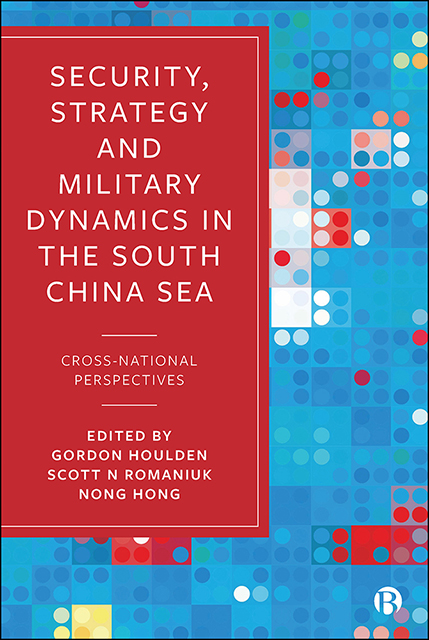Book contents
- Frontmatter
- Contents
- List of Tables
- Notes on Contributors
- Foreword
- Introduction: Strategic Challenges and Escalating Power Rivalry in the South China Sea
- 1 Between Competition and War: Complex Security Overlay and the South China Sea
- 2 The South China Sea as an Echo Chamber of Chinese Foreign and Security Policy
- Part I Claimants of the Contested South China Sea
- Part II Non-Claimants in Southeast Asia
- Part III Quadrilateral Security Dialogue States
- Part IV Non-Claimants in Europe and Eurasia
- Conclusion: Looking over the Horizon – Prospects for Settlement of the South China Sea Dispute?
- Index
Introduction: Strategic Challenges and Escalating Power Rivalry in the South China Sea
Published online by Cambridge University Press: 13 April 2023
- Frontmatter
- Contents
- List of Tables
- Notes on Contributors
- Foreword
- Introduction: Strategic Challenges and Escalating Power Rivalry in the South China Sea
- 1 Between Competition and War: Complex Security Overlay and the South China Sea
- 2 The South China Sea as an Echo Chamber of Chinese Foreign and Security Policy
- Part I Claimants of the Contested South China Sea
- Part II Non-Claimants in Southeast Asia
- Part III Quadrilateral Security Dialogue States
- Part IV Non-Claimants in Europe and Eurasia
- Conclusion: Looking over the Horizon – Prospects for Settlement of the South China Sea Dispute?
- Index
Summary
The South China Sea (SCS) dispute is regarded as the most complex and challenging ocean-related regional conflict in East Asia. The security in the SCS is a concern for both the regional countries (for example, China, Vietnam, the Philippines, Malaysia, and Brunei) and extra-regional countries (for example, the United States (US), Russia, Australia, India, and Japan), among others, due to their strategic and economic interests in this region. While many contend that competition and disputes over the region are principally concerned with its natural resources, others argue that the essence of the dispute is oriented toward China's expanding power and challenge to the status quo position of the US and its hegemonic power, though China has moved against other states in the region to enhance its own strategic position overall, amplifying existing tensions over the region's riches and bring states closer to conflict. China, often characterized as a revisionist power, however, is not the only state to project its intentions to defend its interests in the region. Among other states, the Philippines, Indonesia, and Vietnam also exhibit provocative pursuits and competing interests, potentially imperilling prospects for peace and dispute resolution as well as raising concerns about the increase of military confrontation between states.
State policies, driven in part by revisionist behaviour, have been formulated and implemented not only to support major geographic claims and politicomilitary positions but also to contain the growing military and economic power – notably that of China – and interests of competing states in the region. The US, with its self-claimed “Pivot to Asia” in 2010 and its “Free and Open Indo-Pacific Strategy” efforts to curb the economic and military interests of China and others, has contributed to the militarization of the SCS. China, for its part, has constructed military facilities on several features in the SCS. The US and other outside actors largely situate their concerns regarding the SCS in terms of preserving freedom of navigation (FON). This volume engages the geostrategic motivations, interests, and reactive measures of states concerning the SCS, and aims to present the most comprehensive and elucidating volume on states’ policies and interests in the SCS and their system impact on the security architecture of the region.
- Type
- Chapter
- Information
- Security, Strategy, and Military Dynamics in the South China SeaCross-National Perspectives, pp. 1 - 6Publisher: Bristol University PressPrint publication year: 2021



